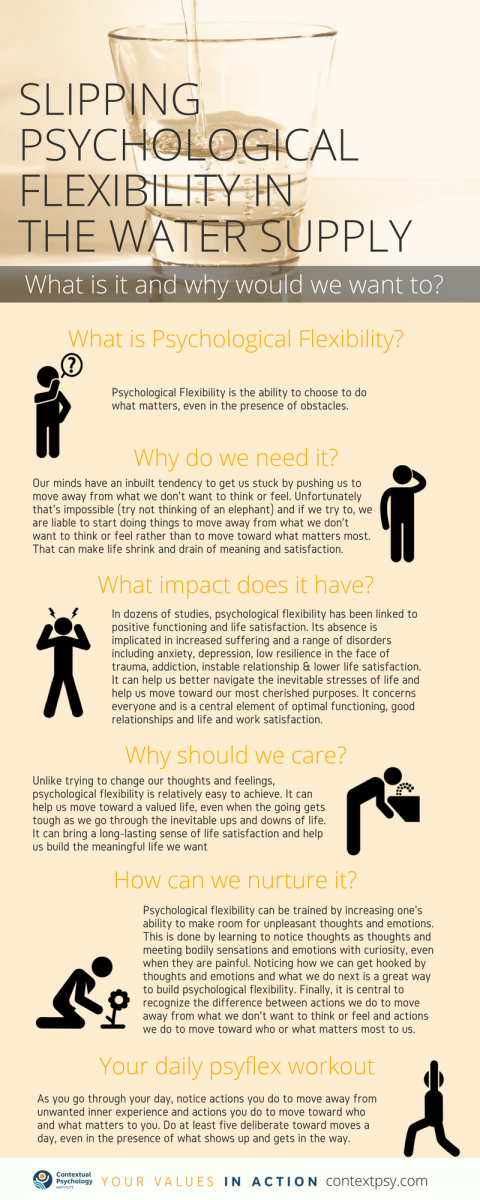At the Contextual Psychology Institute, we are plotting to slip the essence of psychological flexibility into the water supply. Why would we want to do that, and what is psychological flexibility anyway?
Put simply, psychological flexibility is the ability to choose to do what matters most, even in the presence of obstacles. We want to put it in the water supply so that the largest number of people can benefit from this valuable approach to life because we think every human could use it.
Because of the way our minds work, all humans who are gifted with the ability to speak have a built-in tendency to seek to move away from our own unpleasant thoughts and emotions. We seem to be convinced it can be done, yet it’s nearly impossible to not think of something when we are trying not to think about it. Many years of research on thought suppression have shown that trying, for example, not to think of a white bear, only makes thoughts of white bears more present in our minds. A similar difficulty occurs when we try not to feel our emotions that arise, especially the intense ones. We have probably all experienced how trying not to feel angry only seems to feed our anger.
Our “feel-good” culture and our assumptions about rationality deceive us into thinking that we can change our negative feelings into more positive ones and our irrational thoughts into more realistic ones. Behind these assumptions is the belief that thoughts and emotions are direct causes of behaviour.
Psychological flexibility takes a different approach. It recognizes that much of what we think and feel has been programmed by our environment, our learning history, and possibly our genes. It also recognizes that we actually have precious little control over what arises inside us. Worse still, seeking to control it, however subtly or indirectly, may actually make the experience worse and further entrenches those difficult thoughts and emotions, gives them undue importance, and further controls our behaviour.
Being psychologically flexible helps us to do what’s important to us, even in the presence of unhelpful or irrational thoughts, painful emotions, memories or bodily sensations. It helps us move toward who or what matters, even in the presence of these kinds of inner obstacles.
A recent large-scale study conducted in Switzerland suggests that psychological flexibility may be the variable that moderates the impact of stressful work and life events as well as low social support : CLICK HERE FOR ALL THE DETAILS. Intuitively, it makes sense that the more you are able to do what matters to you, even in the presence of obstacles, the more resilient you become when facing major life stressors. Now science confirms it.
Psychological flexibility helps us live a life in line with our most deeply held values and with who or what matters most to us. When our life is aligned with our values, it becomes richer and more meaningful, and we are less likely to fall prey to a whole range of ailments, both mental and physical.
The good news is that psychological flexibility is a trainable skill. It is a skill that we, at the Contextual Psychology Institute, have made our mission to make available as broadly as possible. Slipping psychological flexibility in the water supply is about finding simple and direct ways to get people to engage in valued living. This is not limited to psychotherapy, but extends to parenting, relationships, into schools and universities, in organisations and businesses and even at the public policy level.
Want a taste of psychological flexibility? You can start today by deciding to do four small actions that are directly in line with moving toward who or what matters most to you, no matter how small the action is and no matter what you feel and think about it. Then tomorrow do another four, five or however many you choose.
Then let us know how that bite of psychological flexibility tasted and maybe you can help us add it to the water supply.

